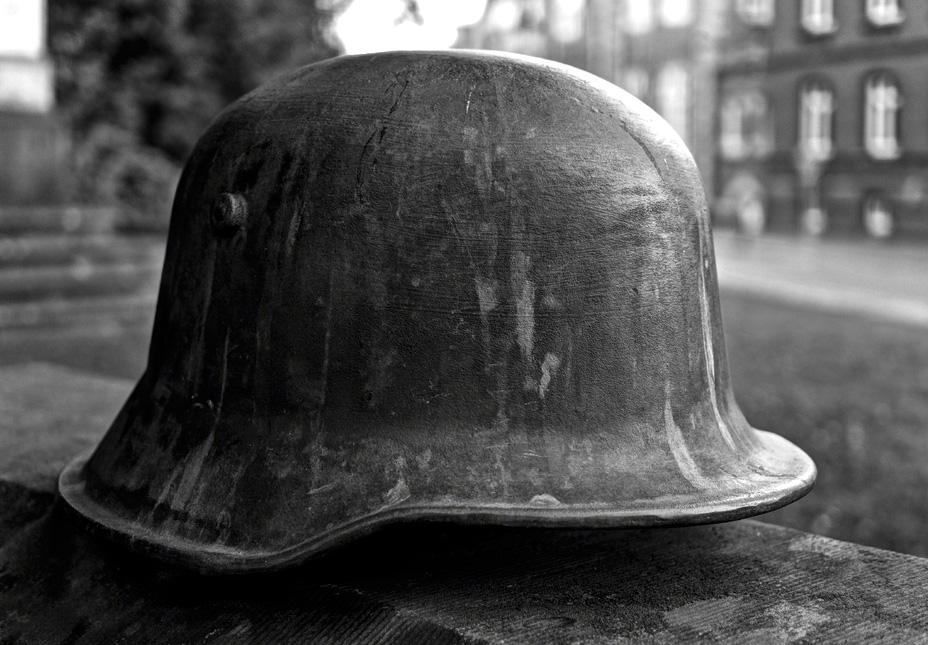Today is Volkstrauertag on which germany remembers those who were killed in war.
Ich hatt’ einen Kameraden,
Einen bessern findst du nit.
Die Trommel schlug zum Streite,
Er ging an meiner Seite
In gleichem Schritt und Tritt.
Once I had a comrade,
None better I have had.
The drum called us to fight,
He always on my right,
In step, through good and bad.
Eine Kugel kam geflogen:
Gilt’s mir oder gilt es dir?
Ihn hat es weggerissen,
Er liegt vor meinen Füßen
Als wär’s ein Stück von mir
A bullet flew towards us,
For him or meant for me?
His life from mine it tore,
At my feet a piece of gore,
As if a part of me.
Will mir die Hand noch reichen,
Derweil ich eben lad’.
“Kann dir die Hand nicht geben,
Bleib du im ew’gen Leben
Mein guter Kamerad!”
His hand reached up to hold mine.
I must re-load my gun.
“My friend, I cannot ease your pain,
In life eternal we’ll meet again,
And walk once more as one.”
Ludwig Uhland, 1809 . Set to Music by Friedrich Silcher in 1825

Today ist Volkstrauertag and germany remembers the ones killed in the wars. The day was proposed in 1919 by the German War Graves Commission (Volksbund Deutsche Kriegsgräberfürsorge) as a commemoration for German soldiers killed in the First World War. It was first held in 1922 in the Reichstag and in 1926, it was decided to observe Volkstrauertag regularly on Reminiscere (the second Sunday of Lent.)
In the Weimar years, Volkstrauertag was not a legal holiday for several reasons:
- The Weimar constitution did not make it clear whether the authority to define legal holidays lay with the Reich or the Länder(states). Over the years this led to local differences in regulations, dates, and interpretations.
- The two largest Christian churches were not in agreement over a suitable date for remembrance since each already had its own day for remembering the dead in November: the Catholic All Souls’ Day and the Protestant Totensonntag. A proposed date in spring, Invocavit (the first Sunday in Lent) or Reminiscere (the second Sunday in Lent), was in Passiontide. This was also important for both churches, since confirmation services take place at this time in many Protestant parishes.
- The political instability of the Weimar Republic obstructed some attempts to regulate the Volkstrauertag day through legislation, since the Reichstag was suspended several times in mid-term.
Heldengedenktag – Heroes memorial day (1934–1945)
On 27 February 1934, the National Socialists introduced national holiday legislation to create Heldengedenktag (Day of Commemoration of Heroes), cementing the observance. In the process, they completely changed the character of the holiday: the emphasis shifted to hero worship rather than remembering the dead. Joseph Goebbels as Propaganda Minister, issued guidelines on content and implementation, instructing that flags no longer be flown at half-mast. The last Heldengedenktag was celebrated in 1945.
Modern form
After the end of World War Two, Volkstrauertag was observed in its original form in West Germany, beginning in 1948. The first central meeting of the German War Graves Commission took place in 1950 in the Bundestag in Bonn. In 1952, in an effort to distinguish Volkstrauertag from Heldengedenktag, its date was changed to the end of the ecclesiastical year, a time traditionally devoted to thoughts of death, time and eternity. Its scope was also broadened to include those who died due to the violence of anoppressive government, not just those who died in war.
An official observation of Volkstrauertag takes place in the German Bundestag. The President of Germany traditionally gives a speech with the Chancellor, the cabinet and the diplomatic corps present. The national anthem and the song “Ich hatt’ einen Kameraden” are then played.
Most provinces also hold their own ceremonies; veterans usually organize ceremonies that include a procession from the respective Church service to a war memorial, prayer by the pastor, speeches by the mayor and the veterans’ chairmen, a military guard of honor, several wreaths are laid, and “Ich hatt’ einen Kameraden”; where available, also with the attendance of a Bundeswehr officer as official representative.




